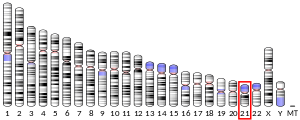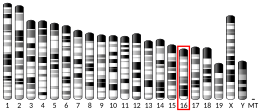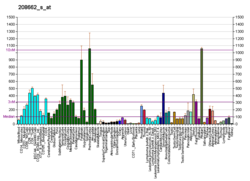| TTC3 | |||||||||||||||||||||||||||||||
|---|---|---|---|---|---|---|---|---|---|---|---|---|---|---|---|---|---|---|---|---|---|---|---|---|---|---|---|---|---|---|---|
| Identifiers | |||||||||||||||||||||||||||||||
| Aliases | TTC3, DCRR1, RNF105, TPRDIII, tetratricopeptide repeat domain 3 | ||||||||||||||||||||||||||||||
| External IDs | OMIM: 602259; MGI: 1276539; HomoloGene: 2487; GeneCards: TTC3; OMA:TTC3 - orthologs | ||||||||||||||||||||||||||||||
| |||||||||||||||||||||||||||||||
| |||||||||||||||||||||||||||||||
| |||||||||||||||||||||||||||||||
| |||||||||||||||||||||||||||||||
| Wikidata | |||||||||||||||||||||||||||||||
| |||||||||||||||||||||||||||||||
Tetratricopeptide repeat protein 3 is a protein that in humans is encoded by the TTC3 gene.
References
- ^ GRCh38: Ensembl release 89: ENSG00000182670 – Ensembl, May 2017
- ^ GRCm38: Ensembl release 89: ENSMUSG00000040785 – Ensembl, May 2017
- "Human PubMed Reference:". National Center for Biotechnology Information, U.S. National Library of Medicine.
- "Mouse PubMed Reference:". National Center for Biotechnology Information, U.S. National Library of Medicine.
- Tsukahara F, Hattori M, Muraki T, Sakaki Y (Mar 1997). "Identification and cloning of a novel cDNA belonging to tetratricopeptide repeat gene family from Down syndrome-critical region 21q22.2". J Biochem. 120 (4): 820–7. doi:10.1093/oxfordjournals.jbchem.a021485. PMID 8947847.
- "Entrez Gene: TTC3 tetratricopeptide repeat domain 3".
Further reading
- Ohira M, Ootsuyama A, Suzuki E, et al. (1996). "Identification of a novel human gene containing the tetratricopeptide repeat domain from the Down syndrome region of chromosome 21". DNA Res. 3 (1): 9–16. doi:10.1093/dnares/3.1.9. PMID 8724848.
- Eki T, Abe M, Naitou M, et al. (1997). "Cloning and characterization of novel gene, DCRR1, expressed from Down's syndrome critical region of human chromosome 21q22.2". DNA Seq. 7 (3–4): 153–64. doi:10.3109/10425179709034031. PMID 9254009.
- Dahmane N, Ghezala GA, Gosset P, et al. (1998). "Transcriptional map of the 2.5-Mb CBR-ERG region of chromosome 21 involved in Down syndrome". Genomics. 48 (1): 12–23. doi:10.1006/geno.1997.5146. PMID 9503011.
- Rachidi M, Lopes C, Gassanova S, et al. (2000). "Regional and cellular specificity of the expression of TPRD, the tetratricopeptide Down syndrome gene, during human embryonic development". Mech. Dev. 93 (1–2): 189–93. doi:10.1016/S0925-4773(00)00259-8. PMID 10781955. S2CID 1109717.
- Hattori M, Fujiyama A, Taylor TD, et al. (2000). "The DNA sequence of human chromosome 21". Nature. 405 (6784): 311–9. Bibcode:2000Natur.405..311H. doi:10.1038/35012518. PMID 10830953.
- Strausberg RL, Feingold EA, Grouse LH, et al. (2003). "Generation and initial analysis of more than 15,000 full-length human and mouse cDNA sequences". Proc. Natl. Acad. Sci. U.S.A. 99 (26): 16899–903. Bibcode:2002PNAS...9916899M. doi:10.1073/pnas.242603899. PMC 139241. PMID 12477932.
- Ota T, Suzuki Y, Nishikawa T, et al. (2004). "Complete sequencing and characterization of 21,243 full-length human cDNAs". Nat. Genet. 36 (1): 40–5. doi:10.1038/ng1285. PMID 14702039.
- Berto G, Camera P, Fusco C, et al. (2007). "The Down syndrome critical region protein TTC3 inhibits neuronal differentiation via RhoA and Citron kinase". J. Cell Sci. 120 (Pt 11): 1859–67. doi:10.1242/jcs.000703. PMID 17488780.
This article on a gene on human chromosome 21 is a stub. You can help Misplaced Pages by expanding it. |






